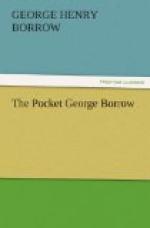* * * * *
To the generality of mankind there is no period like youth. The generality are far from fortunate; but the period of youth, even to the least so, offers moments of considerable happiness, for they are not only disposed, but able to enjoy most things within their reach. With what trifles at that period are we content; the things from which in after-life we should turn away in disdain please us then, for we are in the midst of a golden cloud, and everything seems decked with a golden hue. Never during any portion of my life did time flow on more speedily than during the two or three years immediately succeeding the period to which we arrived in the preceding chapter. Since then it has flagged often enough; sometimes it has seemed to stand entirely still; and the reader may easily judge how it fares at the present, from the circumstance of my taking pen in hand, and endeavouring to write down the passages of my life—a last resource with most people. But at the period to which I allude I was just, as I may say, entering upon life; I had adopted a profession, and—to keep up my character, simultaneously with that profession—the study of a new language; I speedily became a proficient in the one, but ever remained a novice in the other: a novice in the law, but a perfect master in the Welsh tongue.
Yes! very pleasant times were those, when within the womb of a lofty deal desk, behind which I sat for some eight hours every day, transcribing (when I imagined eyes were upon me) documents of every description in every possible hand, Blackstone kept company with Ab Gwilym—the polished English lawyer of the last century, who wrote long and prosy chapters on the rights of things—with a certain wild Welshman, who some four hundred years before that time indited immortal cowydds and odes to the wives of Cambrian chieftains—more particularly to one Morfydd, the wife of a certain hunchbacked dignitary called by the poet facetiously Bwa Bach—generally terminating with the modest request of a little private parlance beneath the green wood bough, with no other witness than the eos, or nightingale, a request which, if the poet himself may be believed—rather a doubtful point—was seldom, very seldom, denied.
* * * * *
I cannot help thinking that it was fortunate for myself, who am, to a certain extent, a philologist, that with me the pursuit of languages has been always modified by the love of horses; for scarcely had I turned my mind to the former, when I also mounted the wild cob, and hurried forth in the direction of the Devil’s Hill, scattering dust and flint-stones on every side; that ride, amongst other things, taught me that a lad with thews and sinews was intended by nature for something better than mere word-culling; and if I have accomplished anything in after life worthy of mentioning, I believe it may partly be attributed to the ideas which that ride, by setting my blood in a glow, infused into my




